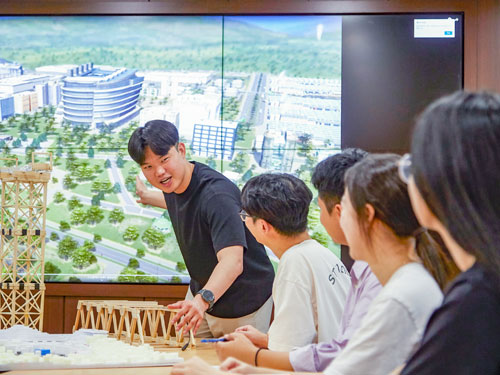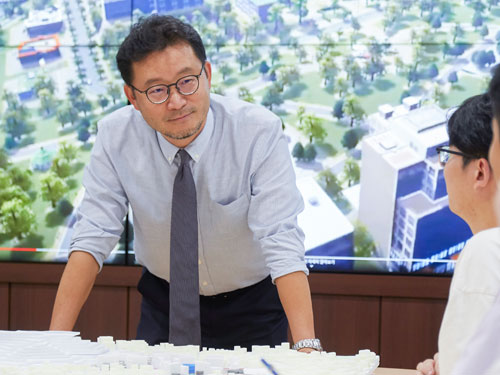- About
- Academics
-
Undergraduate Programs
- Civil and Environmental Engineering
- Architecture and Architectural Engineering
- Mechanical Engineering
- Industrial Engineering
- Energy Resources Engineering
- Nuclear Engineering
- Materials Science and Engineering
- Electrical and Computer Engineering
- Naval Architecture and Ocean Engineering
- Computer Science and Engineering
- Aerospace Engineering
- Chemical and Biological Engineering
-
Graduate Programs
- Civil and Environmental Engineering
- Architecture and Architectural Engineering
- Mechanical Engineering
- Industrial Engineering
- Energy Systems Engineering
- Materials Science and Engineering
- Electrical and Computer Engineering
- Naval Architecture and Ocean Engineering
- Computer Science and Engineering
- Chemical and Biological Engineering
- Aerospace Engineering
- Interdisciplinary Program in Technology, Management, Economics and Policy
- Interdisciplinary Program in Urban Design
- Interdisciplinary Program in Bioengineering
- Interdisciplinary Program in Artificial Intelligence
- Interdisciplinary Program in Intelligent Space and Aerospace Systems
- Chemical Convergence for Energy and Environment Major
- Multiscale Mechanics Design Major
- Hybrid Materials Major
- Double Major Program
- Open Programs
-
Undergraduate Programs
- Research
- Campus Life
- Communication
- Prospective Students
- International Office
- HOME
- Academics
- Undergraduate Programs
- Civil and Environmental Engineering
- Civil and Environmental Engineering
- Architecture and Architectural Engineering
- Mechanical Engineering
- Industrial Engineering
- Energy Resources Engineering
- Nuclear Engineering
- Materials Science and Engineering
- Electrical and Computer Engineering
- Naval Architecture and Ocean Engineering
- Computer Science and Engineering
- Aerospace Engineering
- Chemical and Biological Engineering
Civil and Environmental Engineering
 ChairHwang, Jin Hwan
ChairHwang, Jin Hwan Tel02-880-7342
Tel02-880-7342

Introduction
The Department of Civil and Environmental Engineering at Seoul National University aims to nurture talented individuals who will contribute to the progressive construction, maintenance, and regeneration of social infrastructure and the natural environment necessary for advancing towards a sustainable society. In the undergraduate program, students learn engineering methodologies for the design, construction, and management of structures such as bridges, roads, railways, tunnels, and ports, as well as the smart planning, design, construction, and management of urban and transportation systems, and the maintenance and improvement of the health and quality of the natural environment.
The Department of Civil and Environmental Engineering
provides a platform for talented individuals with a broad perspective, interdisciplinary thinking, and social sensitivity to pursue their dreams of contributing to society.
To address social infrastructure and the natural environment, diverse expertise from both scientific and technological fields as well as the humanities and social sciences is required. Therefore, collaboration among people with different specializations and perspectives is necessary. Graduates of the Department of Civil and Environmental Engineering play a central role in this collaborative process, communicating with various individuals to find engineering solutions. Consequently, the Department strives to nurture individuals with a broad perspective, interdisciplinary thinking, and social sensitivity. Graduates from the Department find fulfillment by contributing to society through their work in social infrastructure and the natural environment.
To foster the desired talent, the Department of Civil and Environmental Engineering offers a wide range of curricular and extracurricular programs related to resilient infrastructure, smart cities, and sustainable environments. In terms of traditional academic disciplines, this includes construction management, spatial informatics engineering, transportation engineering, structural & construction engineering, urban design & planning, hydro-engineering, geotechnical & geoenvironmental engineering, and environmental engineering. While cultivating foundational knowledge in the diverse subfields encompassed by civil and environmental engineering, students also develop systemic thinking and collaboration skills through design and leadership development courses. They learn advanced methods to address social infrastructure and the natural environment using big data and artificial intelligence technologies.
Career Opportunities
Graduates of the Department of Civil and Environmental Engineering contribute to the advancement of the field and the development of technology by becoming professors, researchers at public institutes, and researchers in corporate research centers. They also enter public service, contributing to national development. They may also gain practical experience by working in construction companies, civil and environmental engineering firms, urban design and regeneration firms, IT companies specializing in spatial informatics and transportation services, and various companies in roles related to infrastructure and environmental management. After gaining this experience, they take on responsibilities in the design, construction, maintenance, and project planning and management of social infrastructure.



